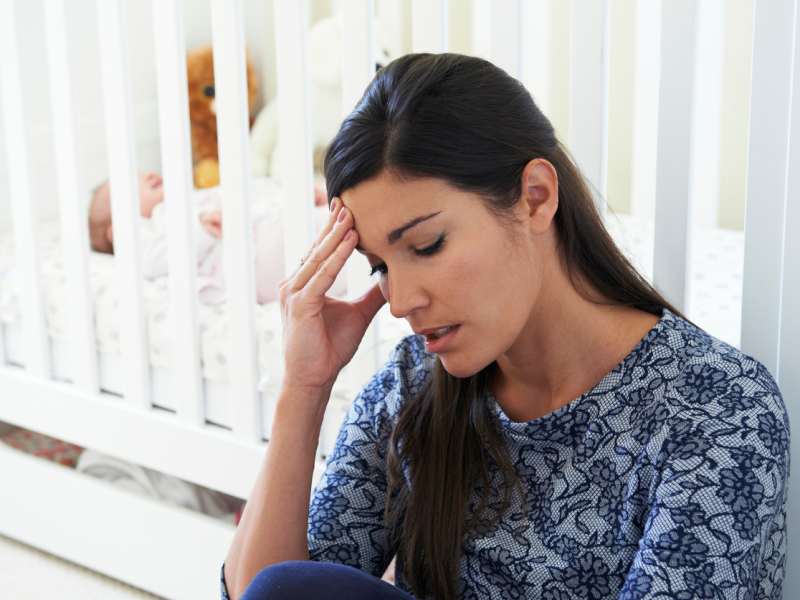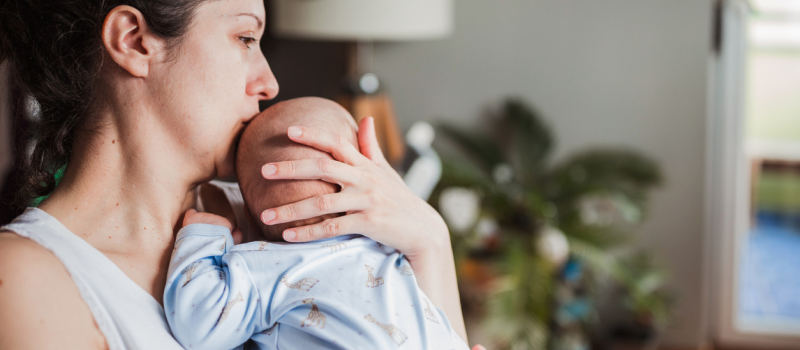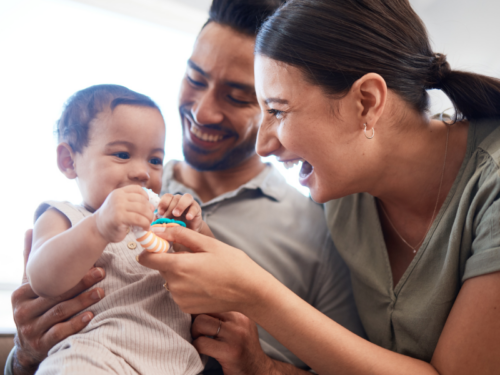
Table of Contents
How to Manage New Mom Anxiety

Written By: Alex Bachert, MPH

Clinically Reviewed By: Dr. Don Gasparini
August 24, 2023
5 min.
Postpartum anxiety, colloquially known as new mom anxiety, can affect everything from sleep to bonding with your baby. Learn how to spot this condition and manage it here.
Learn more about our Clinical Review Process
Table of Contents
How does postpartum anxiety affect new moms?
After 40 weeks (give or take) of pregnancy, most soon-to-be new moms are no strangers to stress. There’s choosing a baby name, creating a birth plan, figuring out financials, and watching your body grow — changes and decisions that can cause anxiety.
For some moms, that stress will continue even after the baby is born — known as postpartum anxiety, or more colloquially as “new mom anxiety.” Postpartum anxiety isn’t always easy to spot, but it can cause irrational fear, guilt, and stress, affecting everything from sleep to bonding with the baby.
For example, someone with postpartum anxiety might stay awake watching their baby all night because they’re scared that the baby will stop breathing. Another example of postpartum anxiety is being too scared to walk down the hallway with your baby because you’re convinced you might drop them over the banister. Postpartum anxiety can even mean refusing to let anyone else hold or feed the baby, even people you trust.

It’s okay to ask for help.
If you’re a new parent in need of more than traditional therapy, we’re here for you.
What are some postpartum anxiety symptoms?
Not all moms will experience the same postpartum anxiety symptoms, but here are some common examples of physical, emotional, and behavioral signs linked with the condition.
Physical symptoms
- Trouble sleeping
- Loss of appetite
- Trouble sitting still
- Nausea or vomiting
- Increased heart rate
Emotional symptoms
- Trouble relaxing or remaining calm
- Irritability
- Forgetfulness
- Obsessing over irrational thoughts and fears
- Racing thoughts
Behavioral symptoms
- Avoiding certain places, people, or activities
- Being overly nervous or cautious about everyday situations
- Control issues
- Repeatedly checking things (like if the baby is breathing)
Is it postpartum anxiety or something else?
Baby blues
Postpartum anxiety
Postpartum depression
Feelings of anxiety, irritability, fatigue, and sadness that usually start four days after birth and end within two weeks.
A condition that can cause irrational fear, guilt, and stress after the birth of a child.
A type of depression that occurs after the birth of a child. Symptoms include depressed mood, severe mood swings, intense irritability and anger, and feelings of hopelessness, worthlessness, shame, or guilt.
So how do people know if they are feeling normal new parent stress, dealing with postpartum anxiety, or facing another mental health challenge?
Due to changing hormones after birth, most new moms will experience what’s called the baby blues. Symptoms of the baby blues—including anxiety, irritability, fatigue, and sadness—usually start four days after birth and end within two weeks.
Compared to the baby blues, postpartum depression and postpartum anxiety have more severe symptoms, last longer, and don’t go away without help. Postpartum depression, a type of depression that occurs after the birth of a child, affects approximately one in seven women. Symptoms include depressed mood or severe mood swings, intense irritability and anger, and feelings of hopelessness, worthlessness, shame, or guilt.
Research shows that depression and anxiety are related in the postpartum period, but new moms can have postpartum anxiety without experiencing postpartum depression, too. It’s also important to note that there are different types of postpartum anxiety disorders. In addition to generalized anxiety disorder, new moms may experience postpartum panic disorder, social anxiety disorder, or obsessive-compulsive disorder (OCD).

What are some risk factors for getting postpartum anxiety?
Postpartum anxiety can affect any new mom, but some causes and risk factors increase a person’s chances of developing the condition. Here are some factors that put people more at risk of developing postpartum anxiety.
Hormone changes
Once a person delivers a baby, their body experiences an abrupt drop in estrogen and progesterone hormones. For some women, this hormonal shift can cause fear, panic, or anxiety.
Stressful events
Having a baby, especially a newborn, comes with certain events that can trigger a parent’s anxiety. For example, you might stress about meeting monthly milestones or be concerned about sudden infant death syndrome (SIDS), the sudden and unexplained death of a baby before their first birthday. Nursing or pumping moms also deal with the stress of feeding their child and maintaining a healthy supply of breastmilk.
Personality type
Some people are natural worriers, and for these people, the added responsibility of caring for and protecting a baby may invoke new mom anxiety.
Other risk factors
- A personal or family history of anxiety, depression, eating disorders, or OCD
- Previous pregnancy loss or loss of a child
- Younger moms or moms who don’t have a supportive partner or a support network
5 tips to help manage postpartum anxiety
1. Prioritize sleep
If you have a new baby, there’s a good chance you’re overtired. Newborns can eat as often as 12 times a day, meaning every two hours, even at night. Between those night feeds and irregular nap schedules, getting as much rest as you’d like might not be possible, but there are several ways to maximize sleep and hopefully minimize stress. For instance, try creating a schedule with your partner (or support system) so that you can take turns caring for the baby while the other person sleeps. Also, be mindful of caffeine intake, which can reduce sleep. Also, the caffeine can transfer to your milk supply if you’re breastfeeding.
2. Connect with other parents
Being a new parent can be incredibly isolating, especially for mothers who typically have access to a longer maternity leave than fathers. Although it can be daunting to open up to others, connecting with fellow parents can do wonders for your mental health. Find a support group online or in your neighborhood to connect with others going through similar experiences with their families. Even just texting with friends or acquaintances who also have children can make a huge difference in reducing parental stress and anxiety.
3. Cuddle your baby
Make time to hold and cuddle your baby, just for the joy of it. Skin-to-skin contact between a mom and baby is said to release oxytocin, a hormone that’s associated with stress reduction, calmness, and bonding.
4. Remember to move your body
Research shows that exercise during and after pregnancy can positively impact a new mom’s mental health. New moms are advised to wait until their six-week postnatal check-up before resuming their fitness routine, but there are plenty of ways to move your body in the meantime. A walk around the block, stretching, and restorative exercises are a great place to start.
5. Work with a mental health professional
If anxiety or other mental health symptoms are starting to impact your ability to care for yourself or your child, consider consulting a mental health professional. For moms dealing with postpartum anxiety, a mental health professional might suggest a talk therapy called cognitive behavioral therapy (CBT) to help manage thoughts, feelings, and behaviors. CBT can help new parents dissect irrational thoughts, manage emotions, and prevent problematic behaviors.
Navigating parenthood and postpartum anxiety with Charlie Health
If you’re struggling with new mom anxiety or need some help managing your stress after your child’s birth, Charlie Health is here to help. Our compassionate team of mental health professionals is here to listen to your story, understand your needs, and match you with an appropriate treatment plan to help you feel your best—for both you and your child.
Charlie Health’s personalized virtual Intensive Outpatient Program (IOP) offers mental health treatment for young people—including young parents—and families who are dealing with a variety of life changes and mental health struggles. Complete this short form to get started today.




